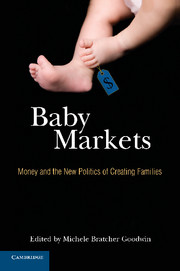Book contents
- Frontmatter
- Contents
- Preface
- Acknowledgments
- Introduction
- PART ONE WHAT MAKES A MARKET? EFFICIENCY, ACCOUNTABILITY, AND RELIABILITY OR GETTING THE BABIES WE WANT
- PART TWO SPACE AND PLACE: REPRODUCING AND REFRAMING SOCIAL NORMS OF RACE, CLASS, GENDER, AND OTHERNESS
- PART THREE SPECTRUMS AND DISCOURSES: RIGHTS, REGULATIONS, AND CHOICE
- PART FOUR THE ETHICS OF BABY AND EMBRYO MARKETS
- 15 Egg Donation for Research and Reproduction: The Compensation Conundrum
- 16 Eggs, Nests, and Stem Cells
- 17 Where Stem Cell Research Meets Abortion Politics: Limits on Buying and Selling Human Oocytes
- PART FIVE TENUOUS GROUNDS AND BABY TABOOS
- Author Bios
- Index
- References
16 - Eggs, Nests, and Stem Cells
Published online by Cambridge University Press: 05 August 2012
- Frontmatter
- Contents
- Preface
- Acknowledgments
- Introduction
- PART ONE WHAT MAKES A MARKET? EFFICIENCY, ACCOUNTABILITY, AND RELIABILITY OR GETTING THE BABIES WE WANT
- PART TWO SPACE AND PLACE: REPRODUCING AND REFRAMING SOCIAL NORMS OF RACE, CLASS, GENDER, AND OTHERNESS
- PART THREE SPECTRUMS AND DISCOURSES: RIGHTS, REGULATIONS, AND CHOICE
- PART FOUR THE ETHICS OF BABY AND EMBRYO MARKETS
- 15 Egg Donation for Research and Reproduction: The Compensation Conundrum
- 16 Eggs, Nests, and Stem Cells
- 17 Where Stem Cell Research Meets Abortion Politics: Limits on Buying and Selling Human Oocytes
- PART FIVE TENUOUS GROUNDS AND BABY TABOOS
- Author Bios
- Index
- References
Summary
For the past few years, stem cell research has been all the news in biomedical research, bioethics, U.S. elections, and on Wall Street. Government, public and private academic institutions, and private corporations are contributing financial support and other resources to pursuing the therapeutic and economic dream of regenerative medicine. Not surprisingly, the news has included calls for regulation. Proposed research moratoriums, funding restrictions, and funding expansions, in turn, have been premised on a volatile mix of public policy concerns. The discourses of both abortion and therapeutic hope heavily influenced the initial policy debate in the United States. Both these discourses remain dominant influences, but because some states are now funding human embryonic stem cell research, the debate is beginning to address other concerns. This shift comes as the interdependence between human embryonic stem cell research and the fertility industry becomes apparent. Eggs and embryos are the raw materials for both human embryonic stem cell research and the fertility industry. Eggs and embryos thus form the reason for the interdependence. In the process, the emerging debate has broadened to include concerns about women's agency, status, and health.
In the U.S. stem cell research context, payment restrictions and informed consent standards for providing eggs have become two key points in the regulatory debate. Major players, including the National Academy of Sciences (NAS) and the California Institute for Regenerative Medicine, have taken positions against payment for providing eggs and for detailed standards in egg donor informed consent.
- Type
- Chapter
- Information
- Baby MarketsMoney and the New Politics of Creating Families, pp. 237 - 249Publisher: Cambridge University PressPrint publication year: 2010
References
- 1
- Cited by

